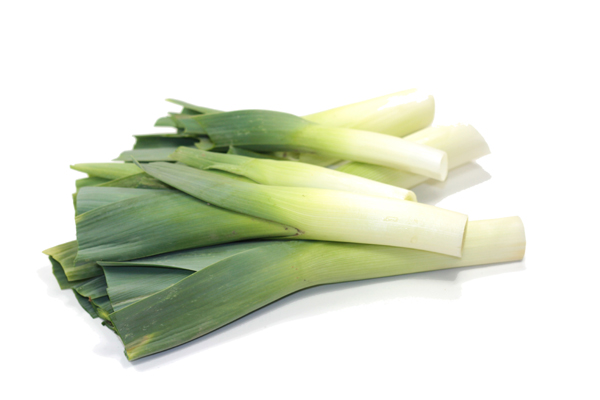The leek is a vegetable that belongs, along with onions and garlic, to the genus Allium, however unlike its fellow members, leeks do not form bulbs. The edible part of the leek plant is a bundle of leaf sheaths called the stem or stalk. While leeks may appear unassuming or even boring, they have several health benefits that are similar to those of garlic and onion.
100 grams of leeks contain about 83g water, 1.5g protein, 14g carbohydrates and minimal fat. Leeks are a source of several vitamins and nutrients including vitamin A, vitamin B6, folate, vitamin C, vitamin K, iron, magnesium and manganese.
Health Benefits of Leeks
1. Fight cancer: Leeks are a good source of allyl sulfides which have been shown to modify certain pathways associated with the growth of tumors.
2. Protects linings of blood vessels: The flavonoid kaempferol which is present in significant amounts in leeks provides protection to the linings of blood vessels, particularly against free radicals or reactive oxygen species. Kaempferol may also increase the production of nitric oxide in the body, a substance that acts as a natural dilator and relaxant of blood vessels, thus allowing blood vessels to rest and lower the risk of hypertension.
3. Protect against heart disease: Studies have shown that members of the allium family have a slight blood pressure lowering effect and may help prevent platelets from clotting which could potentially lead to a heart attack. Leeks can help rid of homocysteine, a molecule that can be very detrimental to cardiovascular health.
4. Weight loss: Leeks are great for weight loss programs as they have a low calorific value. Also, the significant fiber content helps keep one satiated for long and boosts metabolism.
5. Decrease risk of chronic inflammatory diseases: Leeks can fight chronic low-level inflammatory states such as diabetes, obesity and rheumatoid arthritis by virtue of its polyphenol and kaempferol content.
6. Good during pregnancy: Leeks contain a bioactive form of folate called 5-methyltetrahydrofolate. Folate consumption during pregnancy is key to preventing birth defects.
7. Antioxidant properties: The polyphenols found in leeks are known to be strong antioxidants that fight against free radicals that cause chronic disease and aging.
8. Vitamin and mineral action: Leeks contain vitamin C which is important in wound healing and collagen formation. Pyridoxine is important in efficient energy utilization. Vitamin K present in leeks is needed for blood coagulation and for metabolism of bone and connective tissues. Iron is required in the formation of hemoglobin while manganese functions as a coenzyme in many reactions in the body. Eating leeks regularly ensures that you get good amounts of these nutrients.
*organicgardeningnewsandinfo.wordpress.com

